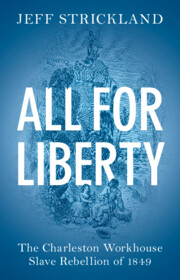Book contents
- All for Liberty
- All for Liberty
- Copyright page
- Dedication
- Epigraph
- Contents
- Figures
- Tables
- Acknowledgments
- Maps
- Introduction
- 1 Slave Insurrections in the Age of Revolutions
- 2 The Slave Workhouse
- 3 Urban Slavery
- 4 The Legal Implications of Slave Resistance
- 5 Rebellion at the Workhouse
- 6 Investigating the Rebellion
- 7 The Crisis of Fear in South Carolina
- Conclusion
- Notes
- Bibliography
- Index
3 - Urban Slavery
Published online by Cambridge University Press: 09 December 2021
- All for Liberty
- All for Liberty
- Copyright page
- Dedication
- Epigraph
- Contents
- Figures
- Tables
- Acknowledgments
- Maps
- Introduction
- 1 Slave Insurrections in the Age of Revolutions
- 2 The Slave Workhouse
- 3 Urban Slavery
- 4 The Legal Implications of Slave Resistance
- 5 Rebellion at the Workhouse
- 6 Investigating the Rebellion
- 7 The Crisis of Fear in South Carolina
- Conclusion
- Notes
- Bibliography
- Index
Summary
Nicholas Kelly was born a slave on a plantation just north of Charleston in 1823. His enslaver, William Kelly, purchased him from Thomas N. Gadsden, one of the most successful slave traders in Charleston. William, a general building contractor who specialized in masonry work, trained Nicholas as a plasterer, a skill he soon mastered. Banks and slave brokers issued short-term mortgages on slave purchases, thus encouraging speculation in slaves. In 1845, William participated directly in the Gulf Coast slave trade, when he brought Nicholas and eleven more slaves to New Orleans. William hired Nicholas out to a New Orleans plasterer. A year later, he left Nicholas in New Orleans to continue working in New Orleans because he commanded such high wages. Nicholas negotiated with William that he could purchase his freedom for $1,000. The deal soured when his slave broker in New Orleans reported Nicholas had not been paying his wages. Nicholas argued he had paid $200 above his normal wages. Regardless, William went to New Orleans to retrieve Nicholas and he literally whipped Nicholas in to the cargo hold.
Keywords
- Type
- Chapter
- Information
- All for LibertyThe Charleston Workhouse Slave Rebellion of 1849, pp. 55 - 93Publisher: Cambridge University PressPrint publication year: 2021



